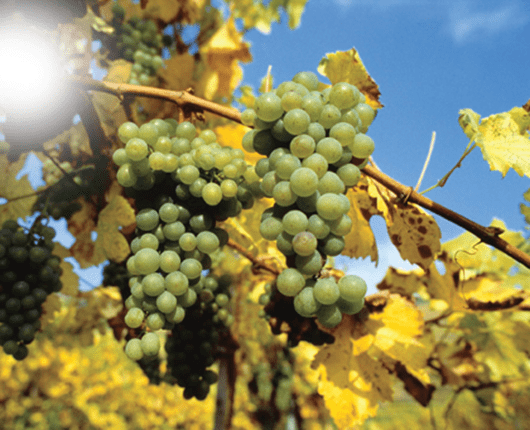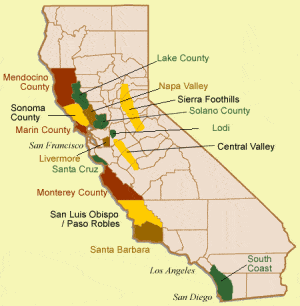
Grüner Veltliner [groo-nur felt-leen-er]
Origin
According to DNA analysis, Grüner Veltliner is thought to be a cross between Grüner Muskateller and Traminer grape vines. The first mention of Grüner Veltliner was in documents dating back to 1855. Before then it was referred to as: Weißgipfler. And you thought Grüner Veltliner was difficult to pronounce!!!
Grüner (its name for short) is also known as, GrüVe, Green Veltliner, Greener Veltliner, Manhardsrebe, Veltliner and Weißgipfler, but luckily, most are labeled just plain Grüner Veltliner!
Place
Grüner is found primarily in Austria (around 1 vine in every 3 vines is Grüner) and also in the Czech Republic, but almost nowhere else in the world.
Most of the best Grüner in Austria comes from the three towns of Kamptal, Kremstal, and Wachau, three districts to the west of Vienna. To use a generalization, the Grüners from Kamptal are soft, Kremstal medium bodied, and Wachau has the most powerful wines. The Danube River follows through all three regions.
Story
Grüner Veltliner wines are made with very little manipulation from the winemaker, i.e the grapes are allowed to ferment naturally and age in stainless-steel tanks (no oak). Minimal chemicals (in the form of pesticides, insecticides, herbicides and fungicides etc.) are also used in the vineyard.
Speaking of chemicals though…there was a slight mishap with Gruner in Austria, back in 1985.
A small group of winemakers decided to add a little diethylene glycol (one of the ingredients in antifreeze) to their Grüner Veltliner. They thought it would add sweetness and body to a wine in an otherwise bad vintage. Allegedly, the scam was only discovered after one of the not-so-intelligent winemakers claimed antifreeze on his tax return!
It should probably be noted that the amounts of diethylene glycol which was added to the wines was actually less dangerous than the wines’ own alcohol content, thus rendering it pretty much harmless. Needless to say, this was a BIG controversy for Austria, and since then, winemaking laws have been tightened so much so that Austria has some of the strictest guidelines in the world.
However; if you happen to see a bottle of ’85 Grüner on your local retailers’ shelf, just keep walking…
Taste
If you’re a fan of Riesling, Grüner Veltliner might be for you. That doesn’t mean to imply that all Grüners are sweet, but wines made from the grape can be best be described as Riesling with a lemon/lime twist and hint of white pepper. Grüner Veltliner tends to be a crisp, light-to-medium bodied dry wine with an edge of spice. It can have mineral, herbal, floral, and it’s known for having a slight white pepper taste on the finish. The grapes can also be harvested late and used to make dessert wine or even Ice-wine.



